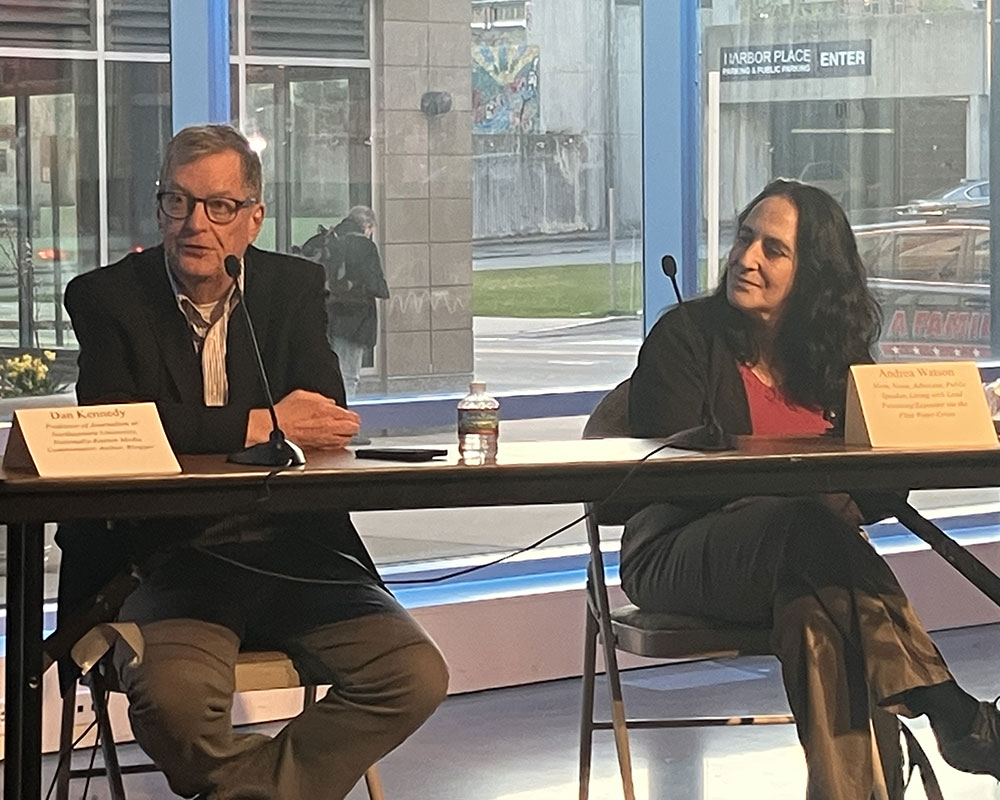(Additional photograph below.)
Advocates and survivors discussed life after lead exposure at a Haverhill panel last week.
Mayor Melinda E. Barrett, who introduced the event, said the city meets state and federal standards. She added that the city will be removing lead from at least 75 houses in the next three years after receiving a $2.4 million federal grant, the only grant of its kind in New England and the largest nationwide, as WHAV reported.
Lead Free MA founder Andrea Watson, who hosted the panel, consumed a significant amount of the toxin after Flint, Mich. switched its drinking water to a contaminated source, a public health disaster that began in 2014. Wanda Carolina Santos, vice president of community living for a center serving adults with disabilities, said her nephew was exposed at age two and has battled cardiac and cognitive issues since, even entering a coma at one point.
Santos said, “We had to become our loved one’s biggest advocates because it was a very difficult situation to live through and not necessarily know and understand why some of those things were happening to a healthy child. In challenging the norm, in challenging doctors, in working alongside good doctors and standing firm in saying that there was exposure.”
Watson said she always brings documentation of her prior blood lead levels so doctors understand her symptoms. She and her son were among the tens of thousands of Flint residents affected.
“I was lying in a hospital bed. I’d lost all of the functions of my left side… I’m one of the people that got out of there—me and my son—and I’m walking. It’s taken a long, long time. I’ve lost a lot of my cognitive ability—not my IQ,” she said.
Laura Spark, environmental health program director at Clean Water Action, said she entered her line of work because of health impacts from a contaminant on a loved one—though she noted it was not lead.
She said of Watson and Santos, “To hear how you’ve both, in different ways, had to fight, it makes me angry and sad, a little bit, because there’s no question that lead is dangerous. It’s been banned in paint since 1978.”
The situation has improved dramatically since the late 1970s and early 1980s, a period when Spark said lead in gasoline may have contributed to high crime rates. Now, Spark explained lead is mostly consumed as paint dust in houses built before 1978.
“We’re most concerned about kids, particularly once they start moving at around nine months because they’re crawling, they’re putting their hands in their mouth,” she said. “While all of us can be impacted by lead, as Andrea I’m sure will talk about, we’re really most concerned about pregnant women and kids nine months to six years.”
Northeastern University Journalism Professor Dan Kennedy, also a panelist, worked at the Daily Times Chronicle in Woburn when a cluster of Leukemia cases was traced to contamination from industrial solvents, including trichloroethylene in the early 1980s. One local reporter’s diligence alerted the state to the issue, according to Kennedy. Local media was also essential during the Flint water crisis, he said, laying the groundwork for the national coverage which ultimately forced state and federal officials to act.
Though old water mains built before can often be the culprit, according to Spark, a new federal law means most of these pipes will be gone in the next 10 years.
“It used to be that a water company wouldn’t have to take action to get rid of a lead service line unless lead in water was fairly high,” she said.
Barrett passed along a statement from Public Works Director Robert E. Ward, who said only 200 of roughly 17,500 lead service lines remain in the city. According to tap water samples from across the city, Ward said Haverhill complies with federal and state requirements. In addition, officials inform homebuyers if there are lead pipes on their property. The city’s water treatment plant can be reached at 978-374-2385.
The forum was moderated by HC Media’s Lindsay Paris.

Laura Spark, environmental health program director at Clean Water Action, and Wanda Carolina Santos, vice president of community living for a center serving adults with disabilities. (WHAV News photograph.)

